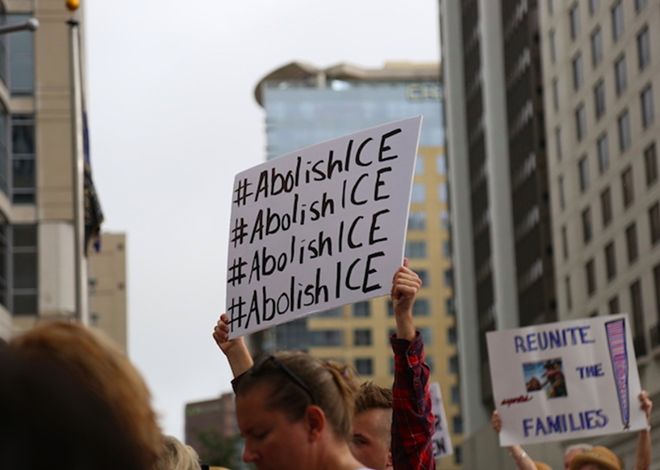As he opened the 2023 legislative session nearly two months ago, Gov. Ron DeSantis targeted illegal immigration.
“We must further strengthen our laws against illegal immigration by enhancing employment verification, increasing penalties for human smuggling and further disincentivizing illegal migration to the state of Florida,” DeSantis said March 7 during his State of the State address.
On Tuesday, with just days left in the session, Republican lawmakers carried out DeSantis’ wishes.
The House gave final approval to a controversial bill (SB 1718) that includes stepping up requirements on businesses to check the immigration status of workers, cracking down on people who bring undocumented immigrants into Florida and collecting data about whether hospital patients are in the country legally.
The bill drew intense, often-personal debate that included lawmakers talking about their families moving to the United States and House sponsor Kiyan Michael describing the day her son Brandon was killed in a car accident caused by an undocumented immigrant.
“Heaven has borders,” Michael, R-Jacksonville, said as she finished speaking to the House. “Hell has none.”
But Democrats called the bill “cruel” and said it would hurt migrants who, for example, might not seek needed hospital care because of concerns about being questioned about their immigration status.
“Immigrants are not the enemy,” Rep. Dotie Joseph, D-North Miami, said. “Hate is.”
The House voted 83-36 to pass the bill along almost straight party lines. Rep. Vicki Lopez, R-Miami, crossed party lines, joining Democrats in opposing the bill. The Senate voted 27-10 to pass the bill last week, meaning it is now ready to go to DeSantis.
DeSantis and the Legislature in recent years have passed a series of changes to target illegal immigration, including a 2019 law that banned so-called sanctuary cities. A federal appeals court last month tossed out a constitutional challenge to that law.
As he prepares for a potential 2024 White House bid, DeSantis frequently blasts federal immigration policies. Republican lawmakers Tuesday pointed to a flood of migrants coming across the country’s southern border in arguing that they need to take steps to address immigration issues and protect Florida residents.
“We can’t solve the problems in Washington, but we can send a message that says in Florida, we’ve had enough,” Rep. Randy Fine, R-Brevard County, said.
But Rep. Marie Woodson, a Hollywood Democrat who immigrated from Haiti, told lawmakers that “until you have walked in the shoes of an immigrant, you will simply never understand.”
“I’m asking (House members) to show some empathy and humanity for immigrants,” Woodson said.
Among key parts of the bill:
— All businesses with 25 or more employees would be required to use the federal E-Verify system to check the immigration status of workers. Since 2021, such businesses have been required to use E-Verify or what are known as I-9 forms.
— Toughen criminal penalties for transporting undocumented immigrants into Florida. While the bill indicates the changes are aimed at curbing human smuggling, opponents raised the prospect of family members and groups such as churches being prosecuted for transporting immigrants into the state.
— Require hospitals to ask patients about whether they are U.S. citizens or are in the country legally. Hospitals would be required to submit reports about the responses to the state.
— Require law-enforcement agencies to take DNA samples from people being held on federal immigration detainers. The samples would be sent to the Florida Department of Law Enforcement.
— Provide $12 million to the state Division of Emergency Management for the “Unauthorized Alien Transport” program, which could transport undocumented immigrants to other states. The program would be similar to the DeSantis administration’s controversial flights last year of 49 migrants from Texas to Martha’s Vineyard in Massachusetts.


